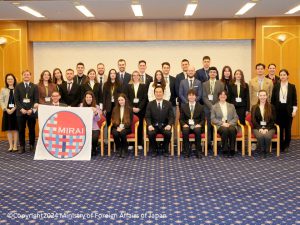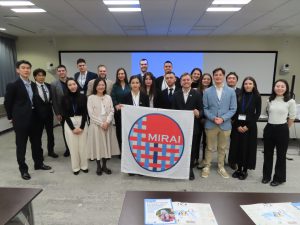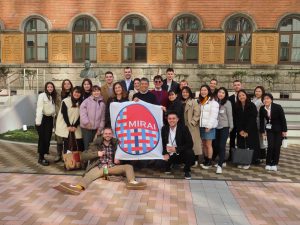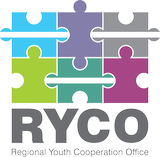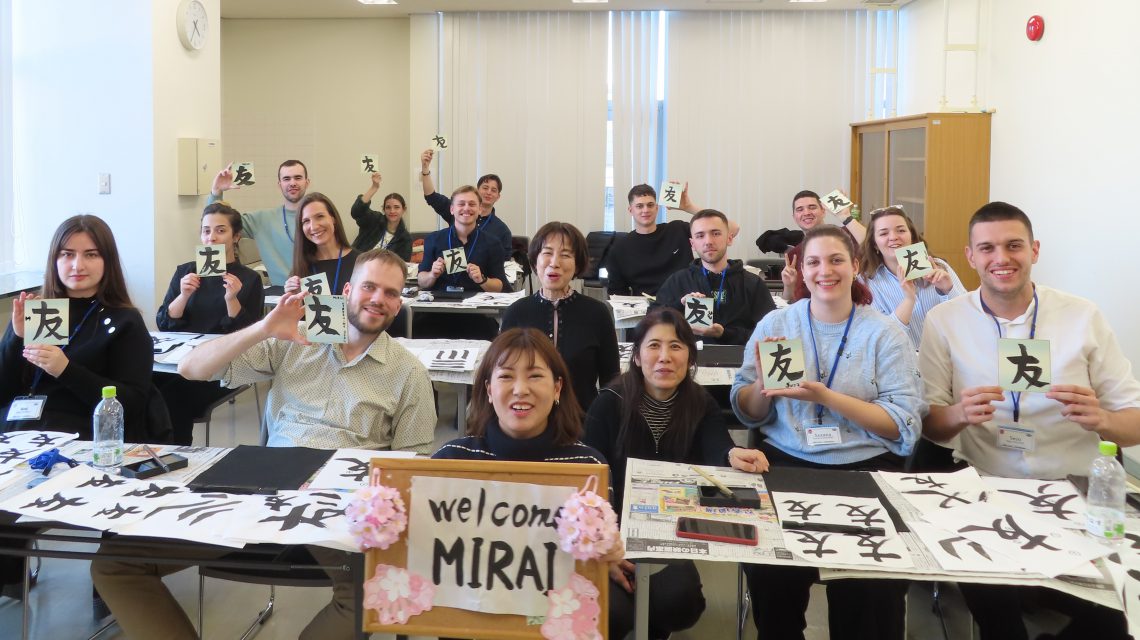WESTERN BALKANS – Reception at the Ministry of Foreign Affairs of Japan officially marked the end of seven-day journey for 13 young people from Western Balkan, who visited Land of Rising Sun within “Japan’s Friendship Ties Program” – MIRAI. In cooperation with the Government of Japan, RYCO has been implementing this project for four years in a row with the aim to promote mutual-understanding, enhance intellectual discussion and build a strong network among future leaders.
From 13-20 February, 13 young people previously selected through a highly competitive process among more than 400 applicants, had an opportunity to visit important historical sites and education institutions in Tokyo and Hiroshima, and through dialogue and discussions deepen their knowledge on peacebuilding and conflict resolution.
Accompanied by the Head of RYCO’s Local Branch Office in Serbia, Mrs. Marija Bulat, MIRAI participants had a chance to engage in a fruitful discussion on peacebuilding with students and a professor from Sofia University, where they shared their understanding of peace, and through interactive group work, offered solutions for overcoming peace threats.
“On that occasion, we toured the university and its campus, met with Japanese students, and discussed with them their way of life, studying, and everything that constitutes student life in Japan. It’s an understatement to say that I returned from Japan with impressions that I will always carry with me, the kindness of the people I met, and the beautiful places we had the opportunity to visit thanks to this program. I hope that other outstanding youth from the Western Balkans will also take advantage of this unique opportunity to visit the Land of the Rising Sun in the upcoming years.” said Dado Dervanovic, participant from Montenegro.
During first days of visit, participants also learned about Japan’s efforts towards peacebuilding through a visit to Japan International Cooperation Agency (JICA) and later, during their visit to Hiroshima, where engaged in an insightful discussion on how Japan dealt with its past, particularly the aftermath of the atomic bomb in Hiroshima.
Medine Dauti, participant from Kosovo* shared her impressions: “As someone who hails from the region scarred by conflict, the Hiroshima tour served me as a powerful catalyst for introspection and transformation. It challenged me to rethink my own views on peacebuilding and reconciliation, urging me to break free from the cycle of violence and embrace a more compassionate and inclusive approach to conflict resolution. The Hiroshima Memorial Park experience not only provided me with a deeper understanding of the consequences of war but also instilled in me a renewed sense of hope and determination to contribute towards building a future where such atrocities are never repeated. It was a journey that not only healed a part of my heart but also inspired me to actively pursue peace in all aspects of my life.”
Visit to Japan offered unique cultural experiences as well, as 13 participants, including graduate and undergraduate students, and young professionals had an opportunity to learn about calligraphy and try themselves in this art of writing. Last day of visit, MIRAI participants paid an official visit to the Ministry of Foreign Affairs of Japan, where they took part in the reporting session and shared their impressions about the program and lessons learned during the visit that they will be able to share with their peers after returning home.
“My journey through Japan with MIRAI visiting program was truly life-changing. From the bustling streets of Tokyo to the serene beauty of Hiroshima and Miyajima island, Japan’s hospitality, kindness, and rich culture left an indelible mark on my heart. The Japanese people exemplify warmth and welcoming, their philosophy centered on self-discipline, respect, and a deep love for their nation. Unlike the Balkans, where punctuality and civic duty are often lacking, Japan’s society thrives on a sense of responsibility for cleanliness, public order, and national development. Their dedication to education as the cornerstone of progress, exemplified by initiatives to welcome foreign students, stands in stark contrast to the stagnation and division prevalent in some Balkan regions.”, emphasized Blendi Hodai, participant from North Macedonia.
By far, around 70 young people from Western Balkan region had an opportunity to participate in the MIRAI program, all sharing impressions of the life-changing experience that broadened their perspectives on intercultural relations, peacebuilding and networking.
Positive impact of this program is an additional motive for RYCO to continue with its implementation in cooperation with Ministry of Foreign Affairs of Japan, and process for selecting candidates will be open later in the year in a form of call published on RYCO website.
*This designation is without prejudice to positions on status and is in line with UNSCR 1244 and the ICJ Opinion on the Kosovo Declaration of Independence.
